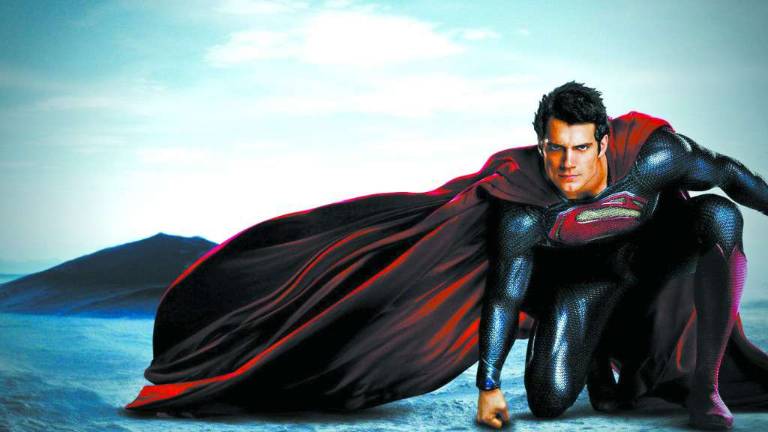Serious Fun

Zack Snyder's Man of Steel is The Godfather of superhero movies
Man of Steel is the first superhero movie to be directed by a real filmmaker since Tim Burton took on Batman in 1989. Unlike Burton, director Zack Snyder's sensibility derives from comic books and graphic novels yet his visual extravagance also contains the palpably erotic core of comic book fantasy. Snyder immediately invests the Superman story with this tactile realism, a feel for ancient legend.
Opening scenes on the dying planet Krypton recall the stylization of 300 but with a slightly futuristic edge that never lapses into conventional superhero movie fantasy. (Snyder got that out of his system with Watchmen.) The arch otherworldliness of Jor-El (Russell Crowe) and his wife Lara Lor-Van (Ayelet Zurer) sending their newborn infant into outer space to survive Krypton's destruction and preserve their heritage from the tyrannical threat of General Zod (Michael Shannon) also evokes a kind of classicism. It doesn't play like sci-fi and when the story shifts to planet Earth where the alien boy Kal-El is raised as Clark Kent, Snyder effectively creates a contrasting, charged-up realism.
In Man of Steel, Snyder's ingenuity--his realistic panache--prevents the Superman story from mainly appealing to either adolescent whimsy or adult camp. He makes a radical break from past Superman movies where cliché narratives, routine violence and a basic lack of seriousness are accepted as standard. Man of Steel is marvelous, serious fun which changes all that.
Kal-El/Clark Kent (played by Henry Cavill) isn't called "Superman" until late in the story; his history and identity are the film's real subject. First seen bursting through flames as a Herculean physical specimen, his alien adjustment to Earth and humanity is a personal trial neatly conveyed through screenwriter David S. Goyer's multiple flashbacks. While Snyder gives the alien's feats a quality of wonder, Cavil conveys surprise, urgency and torment. Snyder is good at the physics of stress (The Legend of the Guardians: The Owls of Ga'Hoole is a masterpiece, I promise you) which separates Man of Steel from The Dark Knight trilogy.
Snyder's consistent intermix of realism and legend upgrades the superhero genre. Cavil's dramatic handsomeness recalls young Sean Connery's exotic virility; his simultaneously otherworldly and legendary aspects suit Snyder's sensuous action style--textured close-ups of skin and capillaries, jet trails in the sky as he flies, his red cape's heavy swoosh. No previous Superman achieved Cavil's perfected gesture of drawing back his right hand when flying to exert physical and spiritual will. Converting iconography from District 9, the Transformer films and Independence Day, Snyder improves on the imagery, giving it a speedy, thrilling roughness, preferable to the usual unimaginatively slick CGI.
What's terrific here is that Snyder expresses Kal-El's force, his will. The yearning to understand himself and his human-likeness gives the film depth. When Kal-El meets the earnest newspaper reporter Lois Lane (Amy Adams) their immediate attraction is so well acted it's deeper than romance. Their passions meet and that's Snyder and Nolan's breakthrough. This is the most stirring, impassioned superhero movie I've ever seen.
By emphasizing Kal-El's conflict with his abilities, desires and his yet uncontrollable circumstances, Snyder discovers his meager genre's richest potential. (One scene offers a beautifully concise Christ-parallel.) Lessons from Kal-El's two fathers are sturdily presented by both Crowe and Kevin Costner (as Jonathan Kent) so that tests of his ideals and his strength against Shannon's Zod (that Frankenstein brow suggesting political warp yet oddly touching like Rutger Hauer's Roy Batty) offer a continuum of masculine being. Eat that Luke Skywalker.
Snyder doesn't cheapen the "S" emblazoned on Superman's chest. "In my world it means 'Hope'" Kal-El says. That's a significant difference from The Dark Knight trilogy's nihilism. The fight against Zod is primarily ethical ("You have developed a sense of morality and we have not--which gives us an evolutionary advantage. If history has taught us anything, it's that evolution always wins.") Yet as Snyder envisions this battle, realism stays in scale with awe-something science can't measure.
As the Supeman-Zod fight escalates so does its 9/11 evocation and Snyder's vision of urban destruction attains the poetry Michael Bay did not, alas, achieve in Transformers III: Dark of the Moon. That evolution comment evokes The Godfather; its implicit "you can kill anybody" suggests 9/11 annihilation which has fed the juvenile thrall of too many comic book movies, Snyder's Superman--symbolizing hope--counters all that. Man of Steel allows sci-fi blockbuster audiences to finally merge from post-9/11 darkness. Thanks to Zack Snyder's artistry, Man of Steel is The Godfather of superhero movies.
Follow Armond White on Twitter at 3xchair